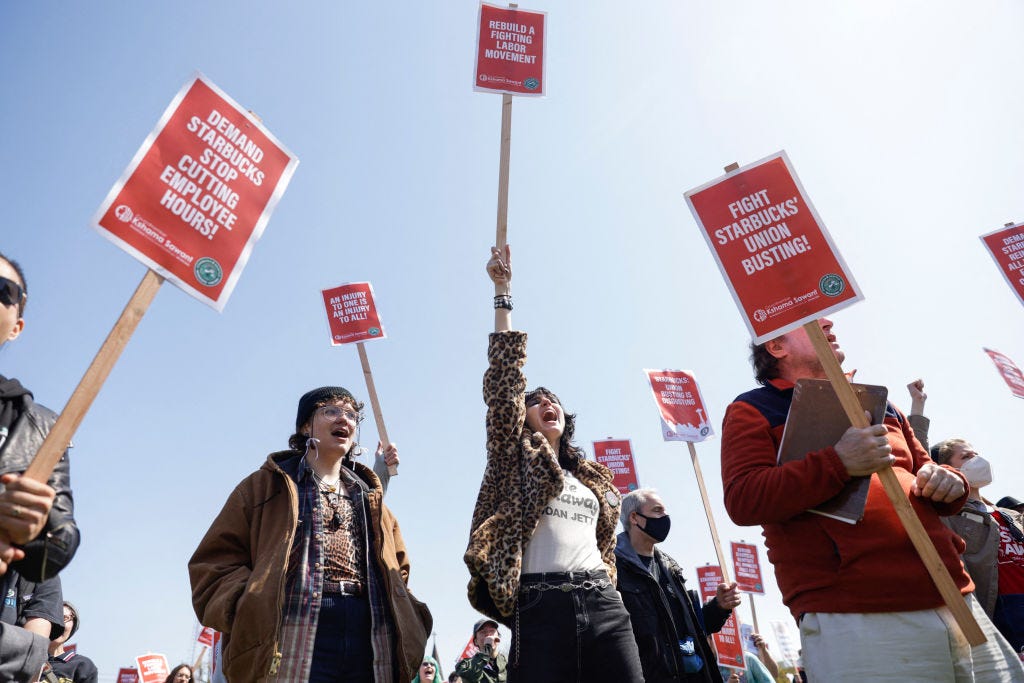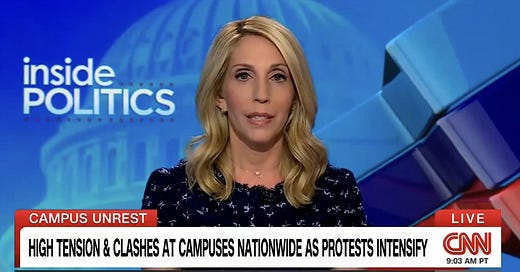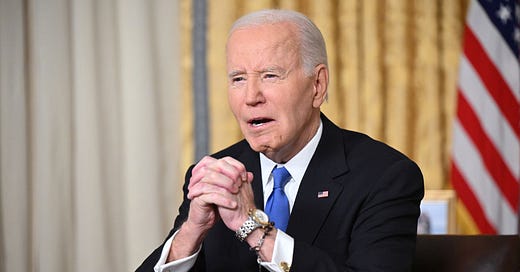
Why Starbucks Is Getting Its Ass Kicked By Its Workers
Discourses with Paul Blest on the swell of Starbucks union drives nationwide.

In March 2021, I reported on the union drive at Milwaukee-based Colectivo Coffee Roasters’ Chain, and all the pandemic-related turmoil that had pushed baristas, bakers, and warehouse workers to demand better from their bosses. The fight was arduous and painful for organizers, with their union election resulting in a tie that took another year to finally resolve.
At the time, the Colectivo drive felt like a minor miracle in a firmly anti-union industry. Since then, though, a wildly successful union drive has been taking place within the biggest coffee company of them all: Starbucks. It seems like every day, another group of Starbucks workers is voting to unionize, despite the increasingly frantic attempts by their bosses to defeat them. Watching this, I’ve found myself elated but still completely befuddled: How is a multi-billion dollar company like Starbucks losing so, so badly?
Luckily, I knew the perfect person to help me understand what’s happening at Starbucks: Vice News reporter, Discourse Blog co-founder/comrade for life, and dear friend Paul Blest, who has become one of the key journalists covering the Starbucks union movement. I spoke to Paul about his reporting on the Starbucks union drive, what workers are fighting for, and why Starbucks’ liberal facade seems to be backfiring.
This interview has been edited for length and clarity.
What inspired you to follow this wave of Starbucks stores unionizing?
I've always been interested in the organizing work of restaurant and fast-food workers. When the Starbucks in Buffalo won their election, I saw the culmination of what the Fight for 15 and coffee workers have been working toward. You wrote that story on Colectivo Coffee last year. I saw the potential there for a resurgence in the labor movement, along with the Amazon workers in Bessemer and Staten Island.
The first story I wrote for Vice on the Starbucks union drive was when seven workers in Memphis were fired after they did a TV interview inside of their store. I've been having conversations with Starbucks workers all over the country for the past several months and trying to get a better idea of what's happening at their stores.
It's been fascinating to talk to people about what working at Starbucks [is like]. This is a major company that has all these different segments that are siloed off. The issues that are happening in one store in Florida might not be the same issues at another store in Maryland, but these are all workers trying to fight for a bigger say in the workplace.
Can you break down how the union drive has grown since the Buffalo union elections?
In September, the first store in Buffalo announced that they were pushing for a union. On December 9, there was a vote at three different stores in Buffalo. One of them won. There was a delay at another, but that store voted to unionize. And another voted against the union.
Within the last four months, it's exploded. It seems like dozens of stores are filing for union elections every week. At this point, workers at more than 250 stores have filed for union elections. Close to 60 have voted to unionize. Less than 10 voted against unionization. This is a very high win rate.
There's been this very slow process for a lot of stores. My colleague Lauren Gurley wrote about this, but Starbucks union filings are making up a ridiculous percentage of new union filings with the National Labor Relations Board (NLRB). NLRB has lost a ton of funding in recent years. Labor union filings are way up, unfair labor practice charges are way up. And the NLRB just doesn't really have the staff to cover it.
It's taking a long time for these filings to get to a vote, but we're going to have hundreds of more votes in the next couple of months. We'll have a better sense of where it's headed by the end of the summer.
There are almost 9,000 corporate Starbucks stores overall, so this is still a relatively small percentage of stores that have voted to unionize. But everybody I've talked to at any store has said they made the decision to reach out to [Starbucks] Workers United. It's not like the Service Employees International Union (SEIU) or Workers United came into their store and said, "Do you guys want to unionize?" [The workers] were the ones that really came up with this.
Is that just the official Starbucks stores, not including licensed Starbucks stores?
Yeah. That's the corporate-run stores, and then there's thousands more stores that are in Krogers and Targets and stuff like that.
There are some Krogers in Wisconsin that are unionized with the United Food and Commercial Workers International Union (UFCW) and the UFCW recently filed for some elections in Wisconsin at Starbucks stores. It's causing a little bit of a tiff between Workers United and the UFCW for that reason, but UFCW is saying, "We already represent Starbucks stores."
It's funny that you mention that. I used to work at an Aramark-licensed Starbucks and I remember getting the feeling from corporate store workers that my store wasn’t a “real” Starbucks.
This is something that has happened a lot between labor unions in the past, just starting turf wars. But for the most part even the workers that I've talked to in Wisconsin who are organizing with Starbucks Workers United are very supportive of the workers at UFCW. One of the workers I spoke to said, "Wisconsin is at 7.5% union density. I want everybody to be unionized." This whole union campaign seems to be building respect between workers at different Starbucks stores, no matter if it's in a standalone store in a strip mall or a Barnes & Noble.
Why are employees unionizing, and what are they asking for?
A lot of the people organizing have been thinking about doing this for years. COVID generally sparked a lot of interest in workers having more power over their own lives. There are constant conversations about democracy in America, but this is one way that democratic participation in your own life can increase, and I think a lot of people are finding that.
People want better pay, more flexible scheduling. One of the big things I keep hearing is that a lot of people started seeing their hours cut this year. Starbucks has benefits if you work a certain number of hours, and some people are getting pushed under that threshold, and that is a huge hit to them. Then there's hyper-local things, like stores where an oven is broken and the store hasn't fixed it, or there's cracked countertops, things like that happening.
What is Starbucks Workers United’s role in these grassroots efforts?
The SEIU is the bigger union. They're not part of the AFL-CIO. One of their affiliates is Workers United, and they have 13 different locals across the U.S. and Canada. Workers United started helping workers organize at the Starbucks in Buffalo, but it was the workers themselves in Buffalo who started organizing.
When somebody reaches out from a store asking, "Can I get some information to unionize?" Workers United is the one putting them in touch with, say for a store in Wisconsin, the Chicago Midwest Regional Joint Board of Workers United. It's a lot of legal support, but the workers are the ones that are sending these letters to first Kevin Johnson, now Howard Schultz saying, "We want to unionize."
This is constantly a debate, especially within the last couple of months — Amazon Labor Union [which won in Staten Island] has no affiliates, but the union in Bessemer was trying to organize with the Retail, Wholesale and Department Store Union. So there's this tension between this grassroots labor union effort and some of the more established unions. I think Starbucks Workers United has melded the two, because this is a grassroots campaign.
I think Workers United seems to have the best strategy right now, because it’s letting Starbucks workers lead. It's letting them take control of their own destinies and try to figure out if they have the support to unionize.
Talking about Colectivo Coffee, what has distinguished the Starbucks union drive from other coffee union efforts that came before it?
I think that doing this store by store has really helped. The stores in Buffalo successfully unionizing was the spark for a lot of this, because Starbucks is such a recognizable brand. They're a public company. So they're going to have a lot more scrutiny than some of the independent coffee shops.
A lot of workers I've talked to have brought up that Starbucks specifically markets itself as a progressive, liberal company. They're trying to attract that kind of worker. This is the end result of that: people who are progressive looking at the store’s professed progressive values and saying, let's make that concrete.
Can you tell me a little bit about the people that you've talked to about what it's been like for them to go through unionizing, especially regarding the risk of retaliation?
Starbucks has a lot of NLRB complaints against it right now. There was a complaint that said Starbucks had retaliated against dozens of workers in the Buffalo region alone, and fired six people for organizing. There's been at least 20 people that I know of who have been fired. That definitely puts fear in some people.
I can imagine it's a draining experience, but also something that these people really believe in. You don't go public with a letter to the billionaire CEO of your company if you don't really believe in this.
The thing that I hear a lot from Starbucks workers is that they love working there and they love their co-workers. A lot of these people do really love their store managers and don't see them as the enemy and truly don't see Starbucks as the enemy. I think that this whole experience is probably fostering a stronger sense of solidarity with the people who are in a similar situation.
What are the employees alleging, and what happens to Starbucks if the NLRB finds Starbucks guilty of retaliation?
They're alleging that their hours are being reduced in retaliation for organizing. There's policies that Starbucks has never really enforced in the past.
I'll give you an example. There's a worker named Angel Krempa in a village near Buffalo at one of the first stores to start organizing, who is a pretty vocal pro-union organizer and had never been written up for anything. Back in November, she swore on the floor. One of her supervisors said, "Watch your mouth." She was like, "I definitely will." This happened on November 23rd.
She testified at an NLRB hearing about a week and a half later. Then a couple of days after the hearing, Starbucks gave her a final written warning for cursing on the floor two weeks before. Then she was written up for being late to work. Her car wouldn't start. And then she got fired. It's stuff like that—enforcing these rules that they have never really stuck to in the past. From the organizers’ perspective, [Starbucks is] finding ways to retaliate against them.
In terms of the process, the NLRB complaints aren't legal orders. Now, it goes to an administrative judge. In terms of the things that they can get for the workers, that's another story. Federal labor law doesn't really lend itself to protecting workers when they're retaliated against. If the claims are found to have merit, really the only thing that they can do is get reinstated and get back pay for the time that they would've worked if they hadn't been fired. For a public company, paying $10,000 to $20,000 in back pay is a bigger PR hit for them than it is a financial hit.
Starbucks denies all of this. They deny that they've ever retaliated against anybody for unionizing. But something I've heard from legal experts that I've talked to is that Starbucks may think that the lack of a punishment makes it so if they wanted to commit retaliation, it's an option that's available to them.
Starbucks is losing the fight over unionizing in their stores. Are they also losing the messaging, too?
They are definitely losing the messaging war. They've marketed themselves towards a middle-to-upper-class liberal customer base, but that kind of person’s perspective on unions has really shifted a lot in the last couple of years.
For example, Biden met with Starbucks workers and [Amazon organizer] Chris Smalls at the White House. But a day afterwards, Starbucks complained in a very long letter that they're super angry that the White House met with pro-union workers while not meeting with anti-union workers and representatives from Starbucks.
Once you're writing haughty emails to the White House about this worker who's spent years working at Starbucks and is very forthcoming about the fact that they love the company and want to make it a better workplace, you're just losing. It looks like a giant corporation trying to crush members of the working class.
The way that they've been going about this is just baffling to me. Howard Schultz has been going on the offensive. They are raising the starting wage to $15 an hour for non-unionized stores. This announcement happened last week, and I saw that multiple stores announced they’re unionizing today.
Starbucks is worth billions of dollars, so how are they losing so vastly? Is it really that their demographic customers' attitudes have shifted that much?
Starbucks hired Littler Mendelson, which is one of the biggest union-busting firms in the country. But they’re losing so many [stores]. One lawyer that I talked to recently said he was shocked.
It's a bunch of different factors. I think it's this couple of years of pent-up anger about COVID. Workers are leading this campaign, and I think it's because these workers are really confident and organized. The arguments that Starbucks is making — that we can do things better for you, that you don't need a union — they're just not buying it.
I think everybody wishes that they had more power in the workplace. That's something that's resonating with a lot of people. As I mentioned before, this is a company that tries to attract a liberal customer base and a liberal workforce. We're seeing the end result of that now: these workers want to unionize.
What are mainstream outlets missing about this story on the wave of Starbucks unions? What people do you recommend following who are also on the Starbucks union beat?
For the most part, I've actually been impressed with a lot of the coverage of the union fight, even from bigger outlets like the New York Times. This is going to be full circle, but I remember talking to Jamelle Bouie about this when I was writing for Discourse Blog, and we were talking about this explosion in digital media unions. I think that this increase in unionization in media in general has reflected a change of perspective that a lot of journalists see. Let’s just be honest, we’re also exploited workers. Maybe not as exploited as somebody who works on the floor at Amazon or Starbucks, but there is an extraction of capital happening.
Is there anything else you want people to know specifically about the Starbucks union drive or this new leaf turning for worker organizing?
The main thing that I want to get across to people is that this is a long thing. This has been an explosion in the past couple of years, at places like Amazon and Starbucks. But this is a long process. Not just from filing or going public to union, to election, but election to contract, this is something that can take more than a year, even if the companies bargain in good faith, which very frequently they don't. There are going to be losses. Amazon workers lost their first fight in Alabama. Then they won in Staten Island and they just lost again at the other warehouse in Staten Island. Starbucks stores are going to lose and there's going to be an ebb and flow.
That doesn't mean that the overall movement is changing. It's really hard to look at these things in a silo. You just have to take it as a whole. This is going to take a long time. I think if you want to change that, you have to change the way that federal labor law is set up in this country. But these are all people who, if they're making the decision to organize themselves and their coworkers, they believe in it very strongly. It's something that they're willing to go through for the next several months of their lives, in order to win an election and then hopefully win a contract.
This blog is part of our interview series, Discourses. To read all of our interviews, click here.













I hope this actually becomes something concrete and goes nationwide in terms of benefits instead of that Blue Wave nonsense.
Unionizing is the closest and best thing we have in this country of ours to exercising true democracy. The more people realize that, the more it’ll dovetail into other parts of our lives outside the workplace.
TL;DR: we save our country through unionization. Workers of the World Unite!
It's a Paul Blest sighting! Man, I wish Discourse could get someone like him. :-)
Also, this?
"Once you're writing haughty emails to the White House about this worker who's spent years working at Starbucks and is very forthcoming about the fact that they love the company and want to make it a better workplace, you're just losing."
*chef's kiss*